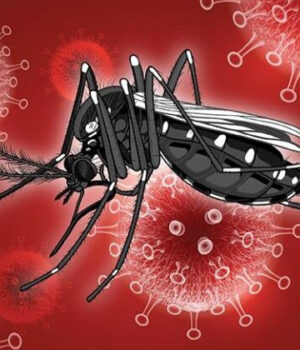The cause behind this alarming trend appears to be multifaceted. While the heavy rains and resulting waterlogging in various areas are being primarily blamed for the spike in cases, a new study conducted by the Translational Health Science and Technology Institute (THSTI) has shed light on an intriguing and unexpected connection between dengue and COVID-19 antibodies.
The surge in dengue infections, which has placed the healthcare infrastructure in Ambala under substantial strain, is largely attributed to the aftermath of heavy rains and the consequent waterlogging. These conditions create fertile breeding grounds for the Aedes aegypti mosquito, which is responsible for transmitting the dengue virus. As these mosquitoes proliferate in stagnant water, the number of dengue cases has surged significantly, causing concerns for both local residents and health authorities.
However, what makes this situation even more complex is a recent study conducted by THSTI, a research institute under the Central government’s Department of Biotechnology. The study, intriguingly titled ‘SARS-CoV-2 antibodies cross-react and enhance dengue infection,’ offers a novel perspective on the dengue outbreak.
This groundbreaking analysis, published on the preprint server for medical sciences known as bioRxiv, delves into the potential interaction between COVID-19 antibodies and dengue infection. While the precise mechanisms at play are still being studied and require further validation, the study suggests that individuals with COVID-19 antibodies might experience a heightened severity of dengue infection.
The interplay between these two distinct viruses, dengue and SARS-CoV-2, raises important questions about the human immune response and the potential implications of co-infections. As scientists worldwide strive to understand and combat the challenges posed by both dengue and COVID-19, this study represents a critical piece of the puzzle.
The implications of this research are far-reaching, particularly as the world continues to grapple with the ongoing COVID-19 pandemic and the recurrent threat of dengue in tropical and subtropical regions. Understanding the dynamics of these viruses within the human body, and how they might interact, is vital for both disease management and the development of effective preventive measures.
The findings from THSTI underscore the complexity of the interactions between viruses and the potential consequences for human health. While more research is needed to fully comprehend the implications of the study’s findings, the insight it provides opens new avenues for scientists and healthcare professionals to better prepare and respond to the coexistence of these viral diseases.
As Ambala and other regions affected by dengue continue to grapple with the current outbreak, this study adds an additional layer of complexity to the ongoing public health challenges. It is imperative that authorities, researchers, and healthcare workers collaborate to address both the immediate concerns related to dengue transmission and the broader questions raised by this innovative research. The intersection of dengue and COVID-19, as explored in this study, underscores the need for a multifaceted and adaptable approach to safeguard public health in an increasingly interconnected world.










